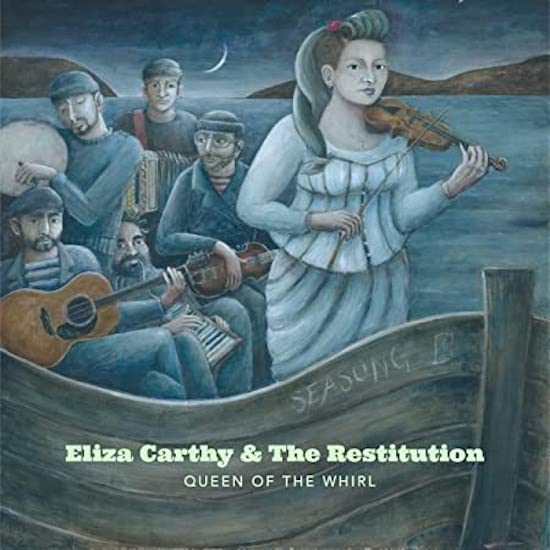Because Eliza Carthy belongs, famously, to a folk dynasty it is easy to take her for granted. It feels as though she has always been around, but the moment to stop and reflect on her career has never quite arrived. Now – almost suddenly it seems – she has been in the music business for thirty years, and has a CV to match her parents, the much-missed Norma Waterson and the godfather of folk, Martin Carthy. A glance at her project list shows just how much she has achieved: two Mercury Prize nominations, a radio history of folk music, theatre work, film and television soundtracks, festivals, and an MBE. But it is not a glamorous or easy life. During the pandemic, she was obliged to appeal online for money to keep her family in their home. Folk royalty or not, living on the proceeds of touring is a tough existence, but it is also live performance that makes the music special. The stand-out feature of Eliza’s career is collaboration, and the alchemy of playing with others – not just the wider family, but an eclectic range of musicians including the likes of Joan Baez, Bill Frisell, Kate Tempest, and Patrick Wolf. In this spirit, Queen of the Whirl celebrates Eliza’s songs by playing them again with a new cast.
Queen of the Whirl is a celebratory best-of, but no cash-in. Eliza has re-recorded songs from throughout her three-decade discography, selected through Twitter polling. Just as Bonnie ‘Prince’ Billy reclaimed his back catalogue with Sings Greatest Palace Music, she has picked the songs her fans love best, and changed them. On the surface this sounds risky, but folk music is never about the primacy of the recording. It is music that evolves through performance over time – in which thirty years is just a blip. From the first notes, it is clear her decision is the right one. The album is book-ended with two of the earliest tracks, from the 1997 Eliza Carthy & The Kings of Calicutt album. ‘Whirly Whorl’ encapsulates the themes running through her music – a traditional song repurposed, an irresistible capering rhythm, thinly disguised sexy goings-on and, at its heart, a social commentary about forced marriage. In the time since it was recorded Eliza’s voice has darkened and deepened, lending serious weight to the song. The album closes with ‘Good Morning Mr Walker’, a song by calypso legend Slinger Francisco, The Mighty Sparrow. It is a tribute to Norma, who introduced her to Slinger, and brings together a whole new set of collaborators, including Jon Boden and John Spiers, Sheema Mukherjee, Rory MacLeod and Lane Steinberg, band leader for The Mighty Sparrow.
It would be easy to make an entirely different best-of selection, and indeed three compilations have been released over the years with limited overlap. Some tracks always feature though, including her infamous track ‘The Company of Men’ with its opening line about blow jobs. In its new version, separated from its original shock value, it becomes reflective, sadder and more powerful. On the other hand, the girl-dresses-as-a-boy-and-goes-to-sea ballad ‘In London So Fair’ turns up for the first time, in a feistier version than on the 2008 Anglicana album and all the better for it. While the original is slow and sad, the new version is upbeat and played with unmistakable relish. Eliza, trying less hard and having more fun, has found the key to unlocking some of her best music.
Eliza’s band, The Restitution, is a powerhouse of contemporary folk players, essential to the way the album sounds. David Delarre’s choppy, yearning electric guitar, Ben Seal’s smokey cabaret bass, Saul Rose’s wistful melodion, Phil Alexander’s fairground piano and Willy Molleson’s dancing drums combine to create a joyous sound. Molleson also sings lead vocals on ‘Mr Magnifico’, lending it more of an Ivor Cutler quality than the original version.
The song is an example of how well much of Carthy’s music has weathered. The eclecticism of her albums has told against her in the past, with reviewers unsure how to understand her approach. Eliza herself describes her work as “English traditional/contemporary music” which begs as many questions as it answers, but definitions don’t really matter. Reclaiming her own history, Queen of the Whirl is unmistakably Eliza Carthy throughout. There is no mistaking her voice, nor her feeling for songs that entertain and undercut expectations in equal measure. She deserves recognition for a career that is a lifetime commitment, for playing a great violin, and for respecting folk history while constantly reinventing it. Queen of the Whirl makes it clear just how good she is.


